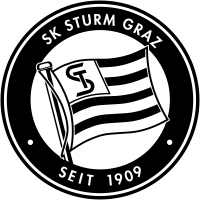Sturm Graz
 |
|
| Full name | Sportklub Puntigamer Sturm Graz |
|---|---|
| Nickname(s) | Die Schwoazn, The Blackies |
| Founded | 1909 |
| Ground | UPC-Arena |
| Capacity | 15,400 |
| Chairman | Christian Jauk |
| Manager | Franco Foda |
| League | Austrian Bundesliga |
| 2015–16 | 5th |
| Website | Club home page |
SK Sturm Graz is an Austrian association football club, based in Graz, Styria, playing in the Austrian Bundesliga. The club was founded in 1909. Its colours are black and white.
In its history, Sturm Graz has won the Austrian Football Championship three times—1998, 1999 and 2011—and participated several times in the UEFA Champions League and UEFA Europa League. Their biggest rivals are Graz neighbours Grazer AK.
SK Sturm Graz was founded in 1909 as a workers team, as opposed to its neighbours Grazer AK, founded in 1902. Between 1921 and 1949, the team enjoyed considerable success in winning the regional Styrian championship 11 times.
The Anschluss in 1938 made Austria part of the German Third Reich and Austrian clubs became part of German football competition. Sturm played in the opening round of the 1940 Tschammerpokal, predecessor to the modern-day DFB-Pokal (German Cup). They then qualified to play in the Gauliga Ostmark, one of Germany's top-flight regional leagues, in 1941. The team withdrew part way through the 1941–42 season and was relegated after an 11th-place result in the following campaign.
In 1949, Sturm entered the Austrian national league as the first non-Vienna-based team.
The first great success came under manager Otto Barić, when the club finished runners-up in the league in the 1980–81 season. In 1983–84, the club battled through to the quarter-finals of the UEFA Cup, beaten only by Nottingham Forest through a penalty in extra-time.
In December 1992, Hannes Kartnig was installed as president, naming his close friend Heinz Schilcher as new manager. At the time, Sturm was languishing under enormous debts. Sturm qualified for the newly formed Zehnerliga, and Kartnig and Schilcher decided the best course of action would be to abstain from big-name signings, opting instead for a new start using young players from the club's youth setup. In 1993, Milan Djuricic became manager.
...
Wikipedia
